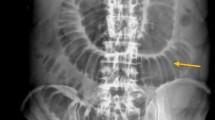Abstract.
We present the case of a 71-year-old woman who was hospitalized because of a severe hip contusion. She had no symptoms or clinical signs of abdominal disease. Routine blood testing showed anemia, presumably owing to occult bleeding. Ultrasonographic abdominal screening revealed ileo-ileal intussusception with a central hyperechoic tumor suggestive of a lipoma as lead point. This diagnosis was confirmed at surgery, where a small bowel resection was performed. Histologic examination disclosed a benign angiolipoma of the ileum with a superficial shallow ulceration which obviously was the source of the occult blood loss. Diagnostic and therapeutic procedures and a literature review are discussed.
Zusammenfassung.
Wir berichten über eine 71 jährige Patientin mit einer Blutungsanämie, die als Zufallsbefund anläßlich einer schweren Hüftprellung diagnostiziert worden war; durch Sonographie des Abdomens wurde eine bezüglich des Abdominalbefunds asymptomatische Dünndarminvagination gefunden. Ursache der okkulten Darmblutung war ein Angiolipom des proximalen Ileum mit Schleimhautulceration, das zur Invagination führte. Histologisch fanden sich als Blutungsursache arterielle Gefäßstümpfe im Bereich des Schleimhautdefekts. Befund, Diagnostik und Therapie werden aufgeführt und anhand einer Literaturübersicht gewertet.
Similar content being viewed by others
Author information
Authors and Affiliations
Rights and permissions
About this article
Cite this article
Manner, M., Scholz, E., Wehrmann, M. et al. Invagination durch ein Angiolipom des Dünndarms – seltene Ursache einer okkulten gastrointestinalen Blutung. Chirurg 72, 305–307 (2001). https://doi.org/10.1007/s001040051310
Issue Date:
DOI: https://doi.org/10.1007/s001040051310




